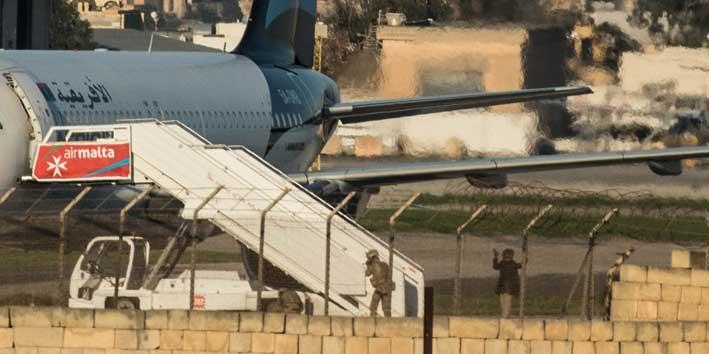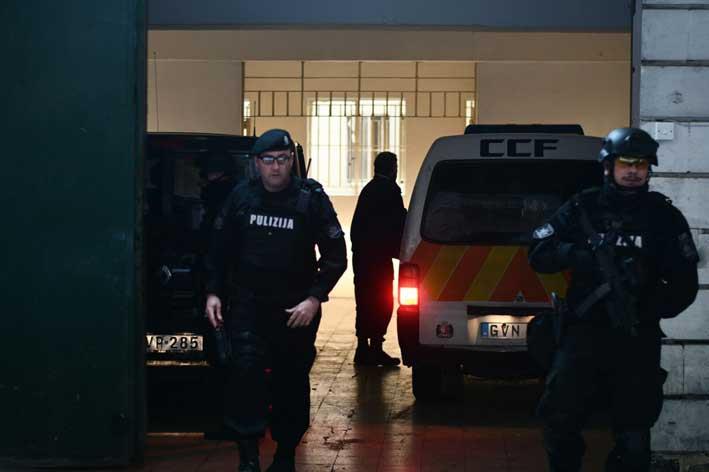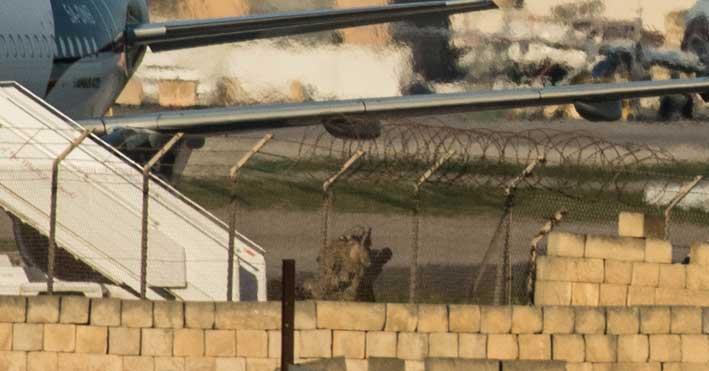The compilation of evidence against the Afriqiyah Airways hijackers resumed this afternoon before Magistrate Anthony Vella. A number of soldiers recounted the moment the alleged hijackers descended from the plane and gave themselves up.
Libyans Moussa Saha Ali Soko and Ali Ahmed Saleh deny hijacking the plane, possession of imitation weapons, using violence against a person on board the flight, holding people against their will, making threats of violence and attempting to cause financial or economic instability for a government of international institution. If they are found guilty of the first charge they can be imprisoned for life.
The hijack took place on 23 December. The two men surrendered to the Armed Forces of Malta’s counter-terror unit several hours after the seized aircraft landed in Malta. It later turned out that they had used replica pistols and grenades.
Last week the court heard how many passengers were unaware of the hijack and thought the plane had been diverted to Malta due to bad weather. Some only learnt of the hijack when the whole ordeal was over. It also emerged that the hijack was rather silent, and the hijackers had handed to the crew a note with the words: “Land in Rome or we will blow up the plane.”

Photo Stephen Busuttil
The court was also told that the captain and a stewardess were also taken to the police HQ for interrogation, and that the former had taken a picture of herself with the hijackers with her mobile phone.
A document found on the plane said Mr Moussa was the leader of a new political group - Al Fatah Al Jadid. The name of the party is linked to the 1969 coup in which Colonel Muammar Ghaddafi seized power in Libya.
A soldier, whose name and rank cannot be published for reasons of national security, said he was part of the team waiting below the airplane. He and a colleague arrested one of the hijackers, Saleh, while two others arrested the second hijacker.
“We performed a quick search on his person, then put him in the vehicle. He was carrying a mobile phone and some money.”
Later, the team boarded the plane to see if anyone else was inside but the aircraft was empty.

Photo Jonathan Borg
Dr Patrick Valentino, who is legal aid lawyer to Ali Saleh, asked how the accused had been identified as a hijacker. “He gave himself up. He identified himself up by separating himself from the group and putting his hands up.”
“So would you have arrested anyone else had they also put their hands up?” the lawyer asked. “Yes, I would have,” the soldier replied.
Replying to questions by Dr Joe Ellis, who is appearing for Mr Moussa, the witness said the accused had not resisted arrest and had been taken to a special holding area after they were handcuffed.
A second soldier said the accused were identified because they were wearing different clothes – the others were Afriqiyah staff. “The suspect in front of me (Saleh) did not appear to be holding anything in his hands,” he said, when asked by Magistrate Anthony Vella.
The soldier said the hijackers came down the steps together with the plane crew but could not tell if the airline employees were frightened or tense. “We were focused on the suspect, watching out for a weapon.” Pressed by Dr Valentino, the witness said the crew did not look scared.

Photo Stephen Busuttil
An officer from the Explosive Ordnance Disposal (EOD) unit took the witness stand next. He said EOD members helped search the suspects and later boarded the plane for the first search. “We found no explosives inside the plane but one of the hijackers had dropped a gun and a grenade on the ground below the plane.” These were taken by the forensics team. “Our main aim was to search for booby traps, and we found none of those.” All cabin bags were searched but nothing suspicious was found.
Another EOD member said what appeared to be a plastic revolver was found wrapped inside a plastic bag inside a passenger bag on one of the seats. The gun was found near the front entrance of the plane. Asked if the gun was a fake, the soldier said he could not confirm this since his task was to check whether the item was booby trapped.
Another witness said he had examined a Beretta pistol that had been discarded on the apron. He could not tell whether this was a fake but an x-ray revealed there were no rounds inside. A second pistol, smaller in size, was also checked and declared safe to handle. The witness said he did not know who had placed the weapons there.
At the start of today’s sitting lawyer Martin Fenech said he had been instructed by the Legal Aid Agency to assist Ali Ahmed Saleh. Mr Saleh has already been assigned lawyer Patrick Valentino as legal aid. The lawyer said he had not been informed about anything from the agency. He asked the court to write to the government and the agency for an explanation as to why a second legal aid lawyer was being assigned to Saleh. Magistrate Anthony Vella said that since the accused has not made any requests he is duly represented at law. As such Dr Fenech was dismissed.
Asked by the court if media reports about a hunger strike by the accused were true, Dr Valentino said the Libyans were eating but one has a medical condition and when they sent a doctor they did not send a translator so they could not understand each other.
Dr Joe Ellis, appearing for Mr Moussa, said his client was not being allowed to watch TV with the other prisoners and could not contact his parents.
The case continues on 19 January.